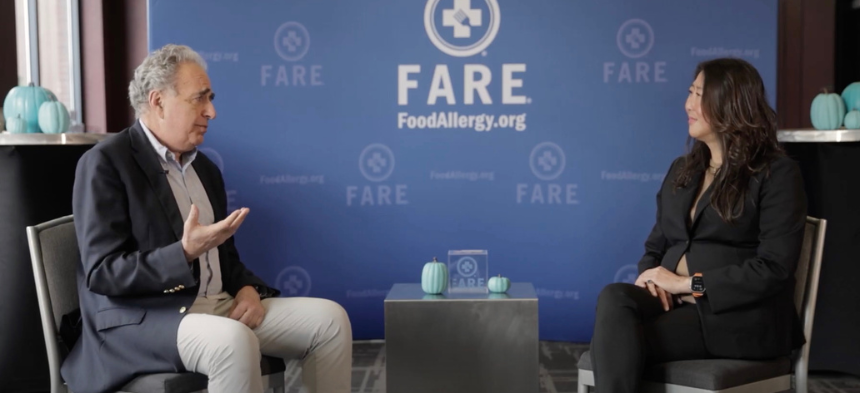Celebrating the 10th Anniversary of the LEAP Study
The LEAP (Learning Early About Peanut Allergy) study showed that feeding infants peanut-containing foods early can help can prevent up to 4 out of 5 children from developing a peanut allergy.

About eighteen years ago, Professor Gideon Lack, MD, MSc, Professor of Pediatric Allergy at King's College London, had a lightbulb moment while speaking with several hundred pediatricians and allergists in Tel Aviv. When asking audience how many of them had seen a child with a peanut allergy, only two or three hands went up—a surprising response because at the time, peanut allergies were becoming more common in the United Kingdom and the United States.
After the lecture, Dr. Lack spoke with local doctors and parents, who shared that Israeli babies were eating peanuts in the form of a peanut-butter-flavored puffed corn snack (“Bamba”) regularly during their first year of life, which seemed to be linked to lower peanut allergy rates. This went against the standard advice in the U.K. and the U.S. at the time, which called for the avoidance of potential allergens. Upon learning this, he wondered, could this early exposure be helping rather than hurting?
Dr. Lack became a principal investigator for a team that, in 2015, published a landmark study in the New England Journal of Medicine, “Randomized Trial of Peanut Consumption in Infants at Risk for Peanut Allergy,” which demonstrated that early introduction of peanuts significantly decreased the frequency of the development of peanut allergy among children at high risk for this allergy. This study showed as much as an 81% relative reduction in the prevalence of peanut allergy when an infant-safe form of peanut food was introduced early (between 4-11 months of age) and fed regularly until 5 years of age. Increasingly, research also suggests that early introduction of other common food allergens, such as egg, may decrease the development of food allergy. FARE was one of the funders of the LEAP study.
The team’s findings were so important that they were put into national guidelines just two years later, when the National Institute of Allergy and Infectious Diseases (NIAID) issued the 2017 Addendum Guidelines for the Prevention of Peanut Allergy in the United States based in part on these results. These are complemented and reinforced by the 2020-2025 Dietary Guidelines for Americans, issued by the United States Department of Agriculture and Department of Health & Human Services.
The shift in knowledge among health care providers has been more gradual. A recently published study shows that only 76% of pediatricians and 52% of family physicians know about peanut prevention guidelines. Families may also then hesitate to take the advice offered, in part because of long-held beliefs and anxiety around risking an allergic reaction. FARE and other organizations are working to speed up the embrace of early introduction practices by raising awareness through campaigns such as “Eat Early, Eat Often.”
To celebrate the tenth anniversary of the LEAP study, Dr. Lack spoke with Sung Poblete, PhD, RN, CEO of FARE (Food Allergy Education & Research). The interview, which took place on site in tandem with the 2025 American Academy of Allergy, Asthma & Immunology/World Allergy Organization Joint Congress in San Diego, California, gave Dr. Lack and Dr. Poblete the opportunity to discuss the LEAP study’s genesis, design, and outcome, as well as looking ahead to next steps.
“I’d like to see us preventing the majority of food allergies and—where we haven’t prevented it—picking up the young children with early onset food allergies, treating them as soon as possible, so that we get effective and safe treatments,” Dr. Lack told Dr. Poblete. “I think the world will be a very different place from now in ten years.”

Eat Early, Eat Often
The evidence is clear: feeding infant-safe peanut foods early AND often is like aerobics for the immune system. FARE’s public service announcement encourages the “Eat Early, Eat Often” approach for new parents, and fosters awareness among health care providers and the larger pediatric community.


